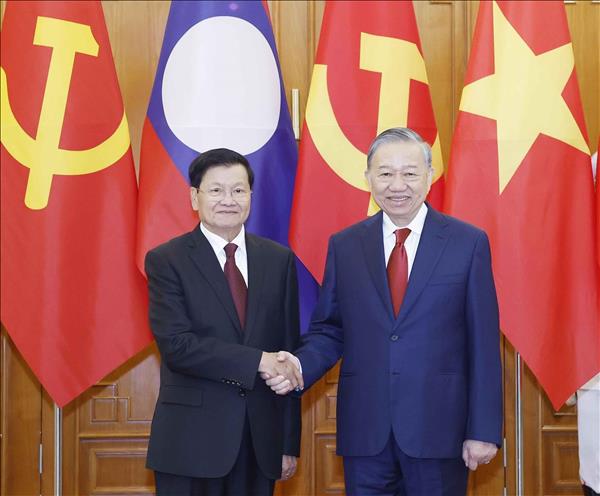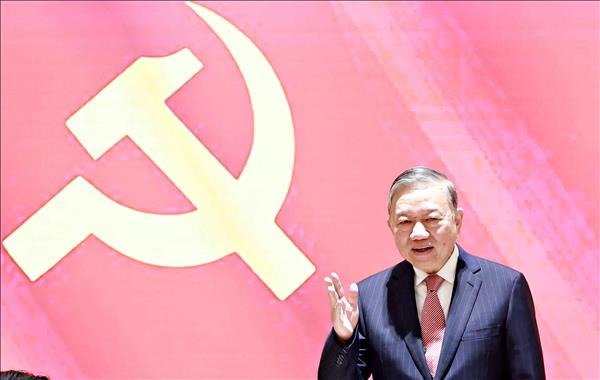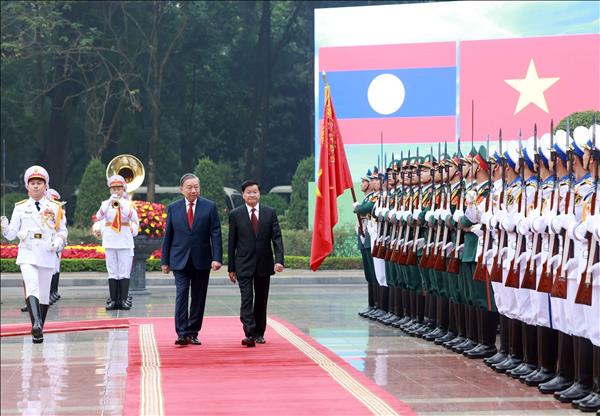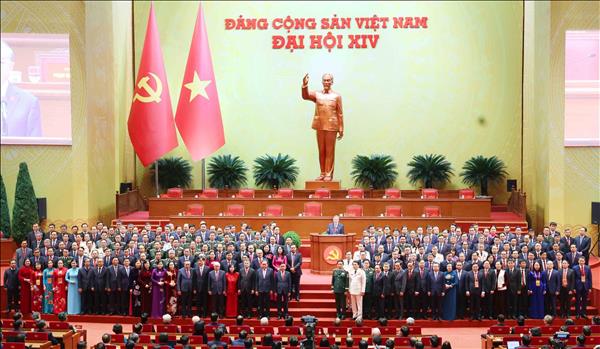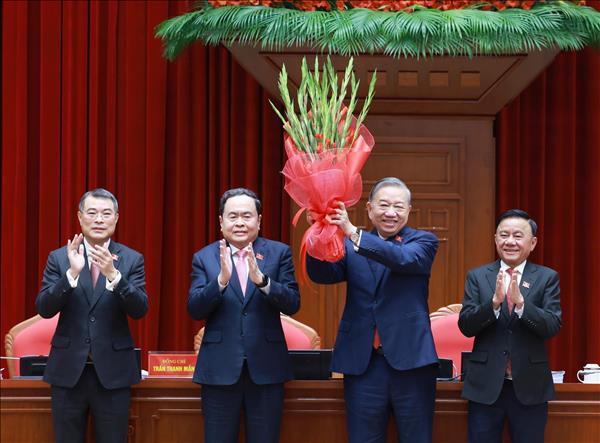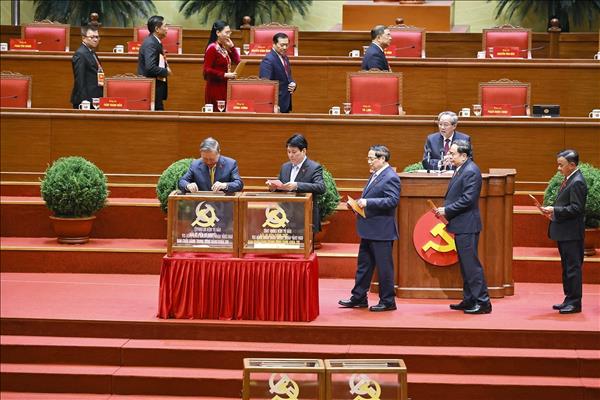During the visit, President Andrzej Duda held talks with State President Tran Dai Quang and witnessed the signing ceremony of cooperation documents between the two nations; had meetings with Party General Secretary Nguyen Phu Trong and Prime Minister Nguyen Xuan Phuc; attended the Vietnam – Poland Business Forum and the inaugurating ceremony of the representative office of the Polish Investment and Trade Agency and met with the Chairman of the Ho Chi Minh City People’s Committee. On the occasion of the visit, the two sides issued the Vietnam –Poland joint statement.
At the meetings, the two sides expressed their satisfaction with active developments of the traditional relations and multifaceted cooperation during the 67 years of Vietnam and Poland’s relationship.
The leaders applauded facilitating high level political dialogues and the exchange of all-level visits via the State, Government, National Assembly, business and local channels to promote further bilateral cooperation in shared concerns of the two countries.
The two sides appreciated the achievements in bilateral trade and investment cooperation as well as efforts made by the two countries in negotiating and signing a financial cooperation framework agreement worth 250 million euros, creating a legal basis for the implementation of cooperation projects in Vietnam using official development assistance (ODA) provided by the Polish Government.
They agreed to negotiate and sign an agreement on a qualifications reference framework to promote learning mobility. The leaders also signed a letter of intent to set up a Polish course between Hanoi University and the Polish Ministry of Science and Higher Education.
The two sides shared experiences and reached a consensus on strengthening cooperation in the fields of agriculture and environment; underlined the importance of the bilateral collaboration in science-technology and information and communications in the context when the world is entering the industrial revolution 4.0. They also agreed to boost the bilateral cooperation in culture and tourism and share experiences in preserving relics and developing heritages’ value.
They also agreed to boost national defense-security ties, especially the defense industry and military training and share experiences participating in UN peacekeeping missions as well as overcoming the consequences of unexploded ordnances; co-ordinate and support mutually regional and international issues of shared concern; and further cooperate in organizations and multilateral forums./.
At the meetings, the two sides expressed their satisfaction with active developments of the traditional relations and multifaceted cooperation during the 67 years of Vietnam and Poland’s relationship.
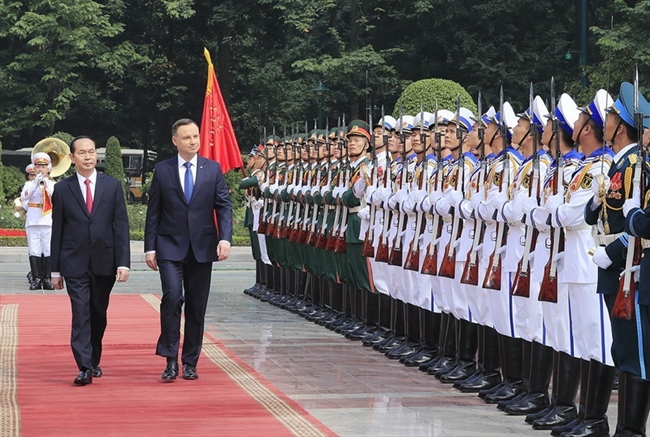 On November 28, 2017, at the Presidential Palace, State President Tran Dai Quang and his wife hosted the welcoming ceremony for Polish President Andrzej Duda and his wife during their State-level visit to Vietnam. In the photo: The two leaders review the honor guard. Photo: Nhan Sang/VNA 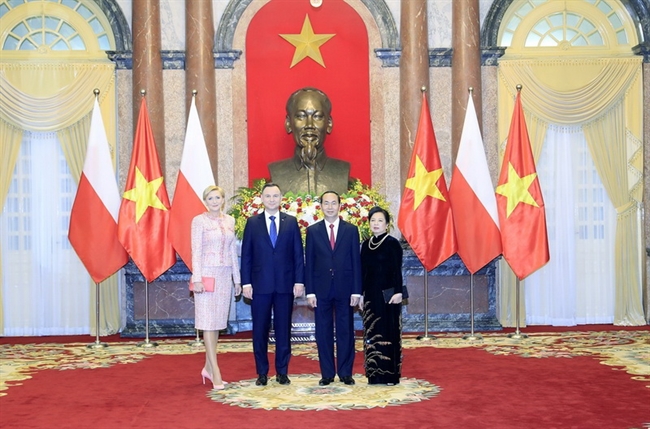 State President Tran Dai Quang, his wife and Polish President Andrzej Duda and his wife pose for a photo. Photo: Nhan Sang/VNA 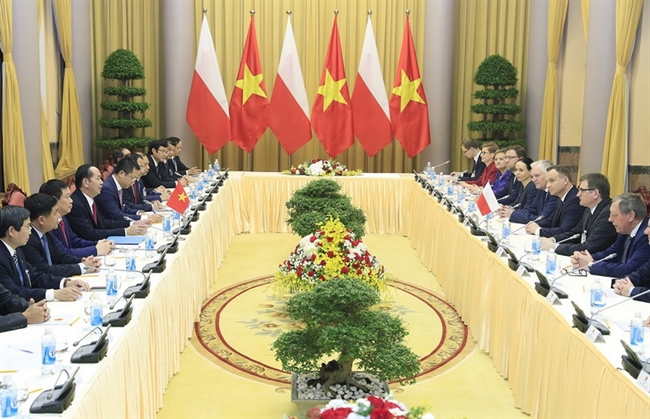 The two presidents hold talks. Photo: Nhan Sang/VNA 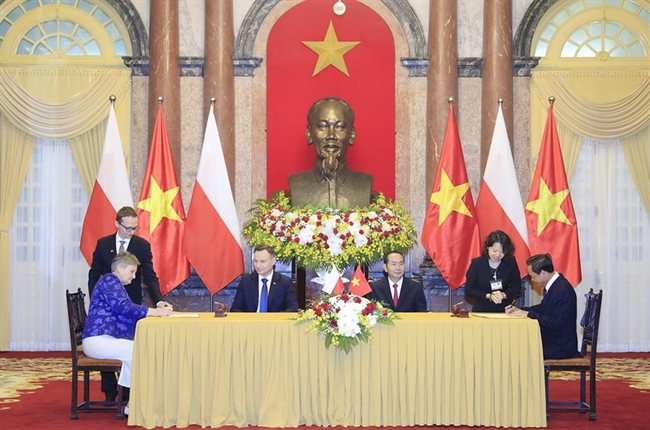
After their talks, the two leaders witnessed the signing of cooperation documents between the two 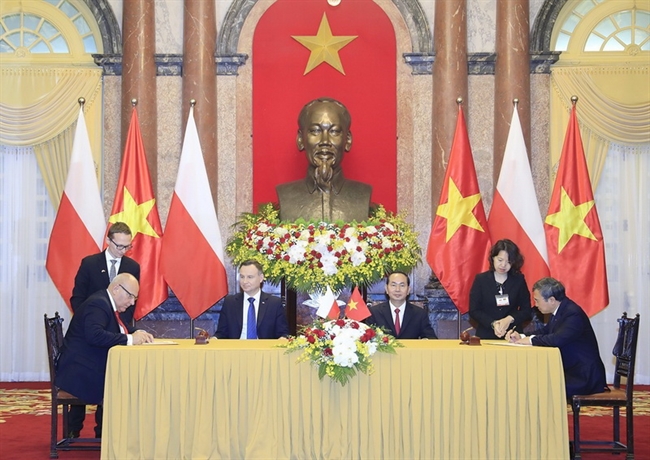 The two leaders witness the signing ceremony between Vietnam’s Ministry of Trade and Industry, and Poland’s Ministry of Economic Development and Finance. Photo: Nhan Sang/VNA 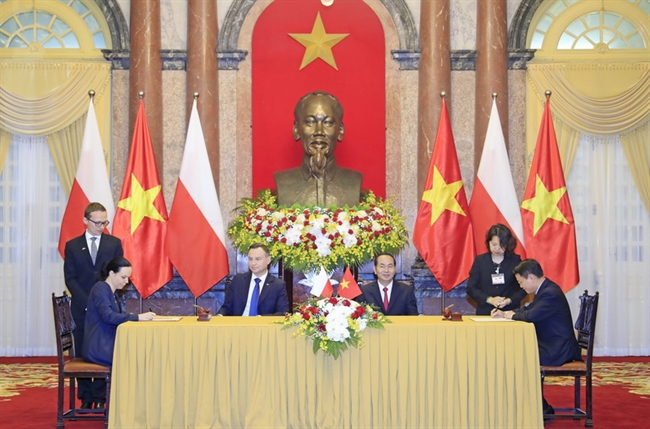
The two presidents witness the signing ceremony of a MoU on cooperation 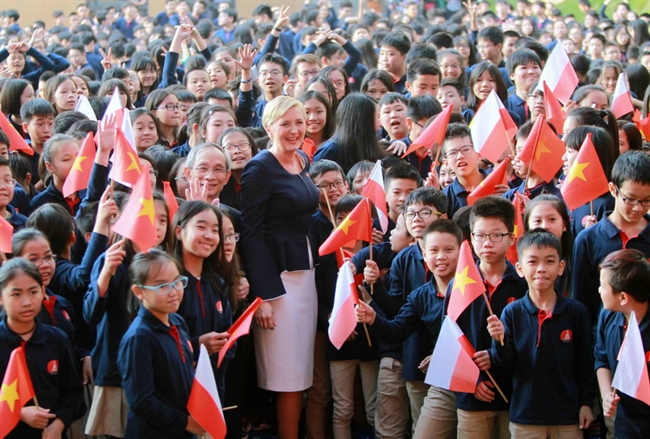 On the occasion of the visit, President Andrzej Duda’s wife Agata Kornhaauser – Duda attended the 150th birthday anniversary of Scholar Marie Skłodowska Curie (1867-2017) held by Hanoi’s Marie Curie High School. In the photo: President Andrzej Duda’s wife Agata Kornhaauser – Duda and students of Hanoi’s Marie Curie High School. Photo: An Dang/VNA 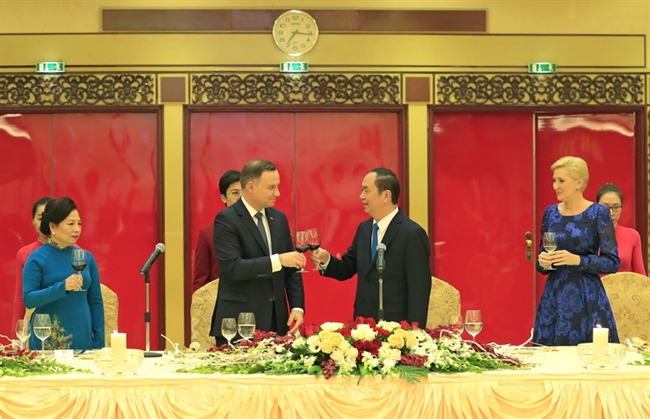
On November 28, 2017, State President Tran Dai Quang and his wife hosted a banquet |
The leaders applauded facilitating high level political dialogues and the exchange of all-level visits via the State, Government, National Assembly, business and local channels to promote further bilateral cooperation in shared concerns of the two countries.
| On November 28, 2017, State President Tran Dai Quang and his Polish counterpart Andrzej Duda witnessed the signing ceremony of a memorandum of understanding (MoU) between Vietnam News Agency (VNA) and the Polish Press Agency (PAP). The MoU was signed by VNA General Director Nguyen Duc Loi and Polish Ambassador to Vietnam Barbara Szymanowska. Under the MoU, the two agencies will exchange text news, photos and video clips in English for the purpose of publishing them on their news channels. |
They agreed to negotiate and sign an agreement on a qualifications reference framework to promote learning mobility. The leaders also signed a letter of intent to set up a Polish course between Hanoi University and the Polish Ministry of Science and Higher Education.
The two sides shared experiences and reached a consensus on strengthening cooperation in the fields of agriculture and environment; underlined the importance of the bilateral collaboration in science-technology and information and communications in the context when the world is entering the industrial revolution 4.0. They also agreed to boost the bilateral cooperation in culture and tourism and share experiences in preserving relics and developing heritages’ value.
They also agreed to boost national defense-security ties, especially the defense industry and military training and share experiences participating in UN peacekeeping missions as well as overcoming the consequences of unexploded ordnances; co-ordinate and support mutually regional and international issues of shared concern; and further cooperate in organizations and multilateral forums./.
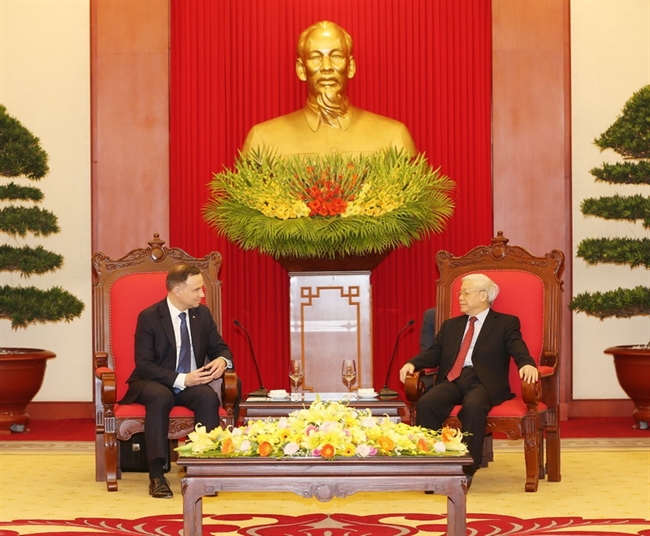 At the Party Central Committee’s headquarters, Party General Secretary Nguyen Phu Trong receives President Andrzej Duda during his state-level visit to Vietnam. Photo: Tri Dung/VNA 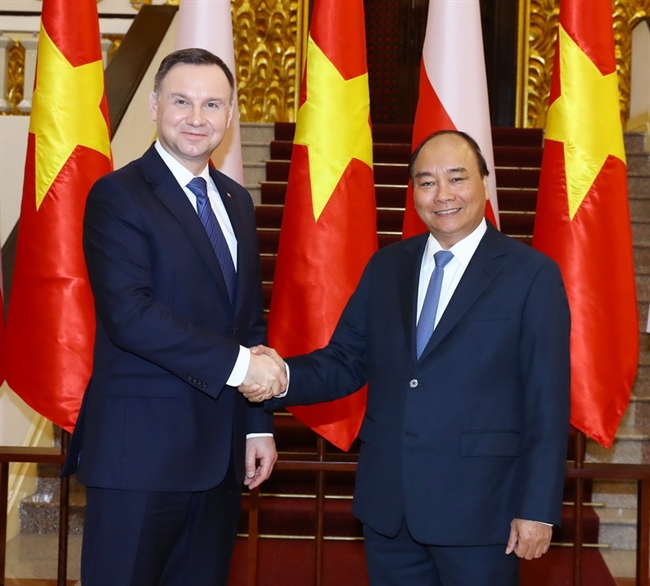 At the Government’s headquarters, Prime Minister Nguyen Xuan Phuc has a meeting with President Andrzej Duda. Photo: Thong Nhat/VNA 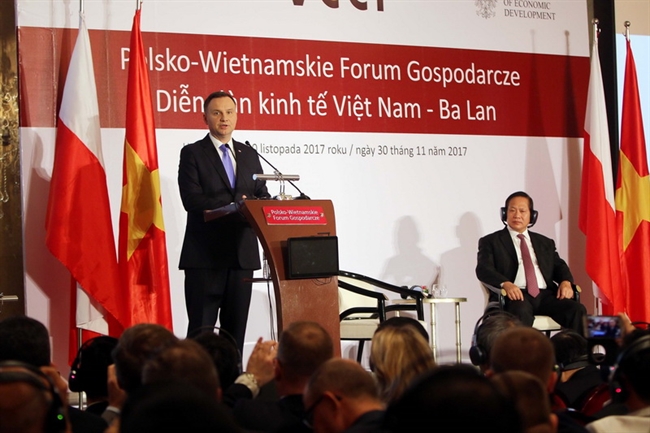 On November 30, 2017, President Andrzej Duda attended and addressed the Vietnam-Poland Business Forum in Ho Chi Minh City. Photo: Thanh Vu/VNA 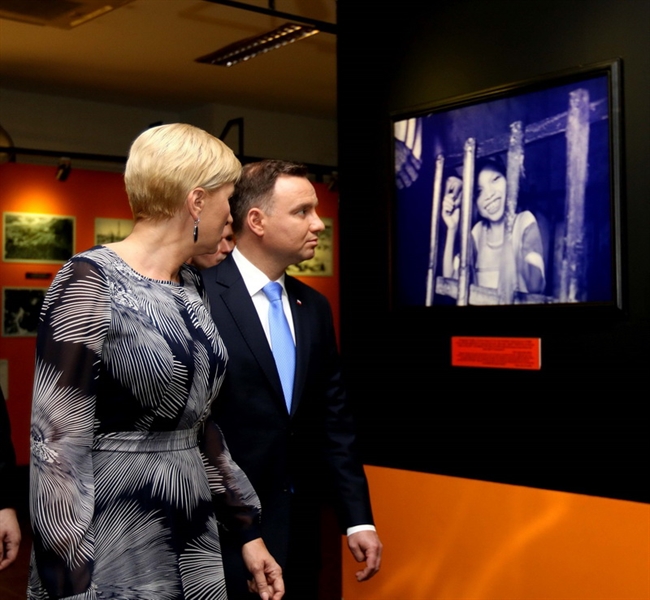 TOn the occasion of the visit, President Andrzej Duda and his wife visit the War Remnants Museum in Ho Chi Minh City. Photo: Thanh Vu/VNA |
| Poland is now Vietnam’s largest trade partner in Central Eastern Europe while Vietnam is Poland’s seventh largest trade partner outside the EU. Vietnam exports to Poland garments and textiles, aquatic products, rice, coffee, pepper, confectionery, agricultural products, mobile phones and electronic products and imports milk, pharmaceuticals, fruit and equipment of mining and ship building |
By VNA/VNP

